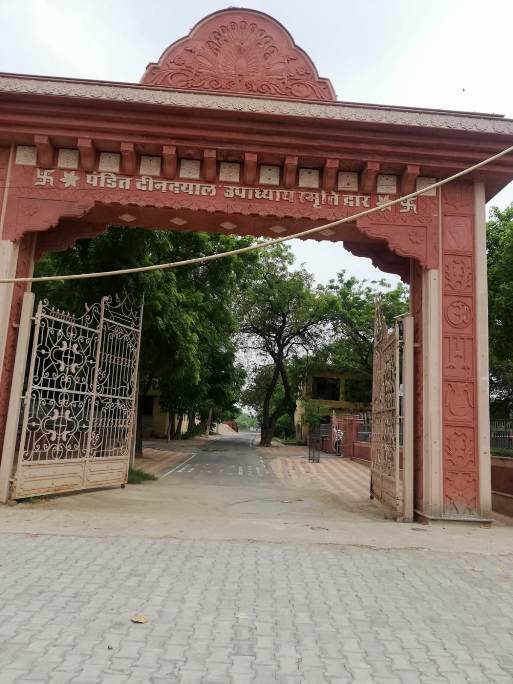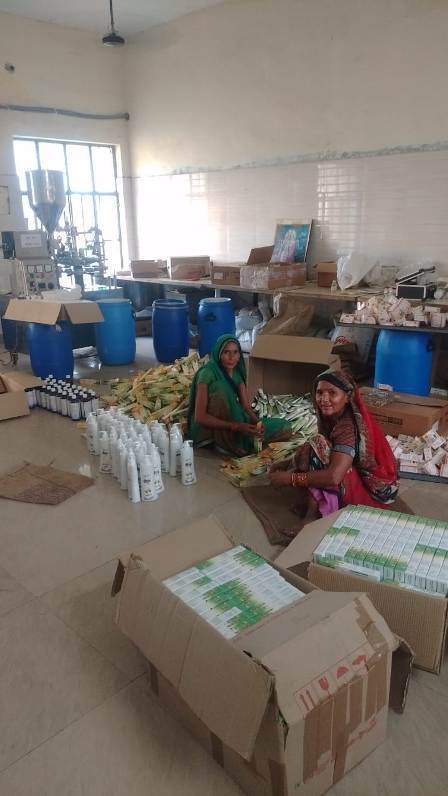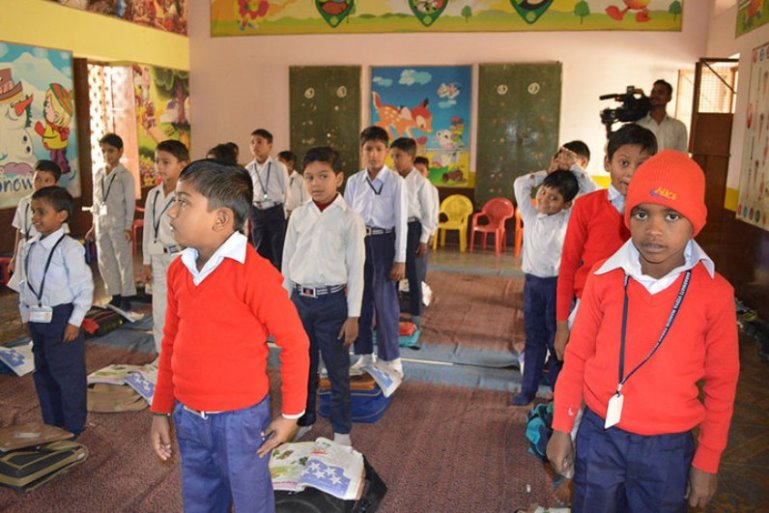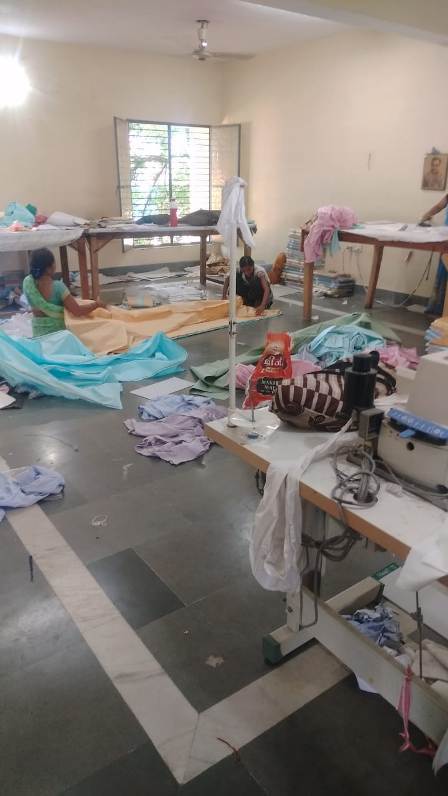Pandit Deendayal Dham, Mathura - A Hub of Empowerment and Progress
Mathura | Uttar Pradesh

- Pandit
Deendayal Upadhyay Memorial Gate.
In the Farah region of Devbhoomi Mathura, the journey of sweet water spans miles reaching villages and blessing the residents in various ways – cascading over shoulders, atop heads, or filling the utensils grasped by women, children, and even men. Amidst the pervasive saltwater surroundings, each drop of freshwater becomes a precious commodity, often sparking conflicts among villagers and leading to frequent disputes over this vital resource. The agrarian landscape, heavily reliant on water, witnesses daily skirmishes over access.

Witness
the prowess of women working in Deendayal Dham's Ayurvedic Medicine
Manufacturing Shop.
Farming the primary
occupation in this region sustains the livelihoods of the residents, yet falls
short of providing for the prosperity of future generations. Faced with
necessity, some families find themselves compelled to migrate in search of
employment opportunities. Additionally, the absence of proper educational
facilities further compounds the challenges faced by the community.
However, when a Yogi emerges in a land, the people are destined to reap the rewards of his years of penance. In the case of Nagla Chandrabhan village situated 22 kilometers away from Mathura in the Farah area, the birthplace of Pandit Deendayal Upadhyay ji, the transformation is profound. Today, this village is recognized as Deendayal Dham, a testament to the transformative impact of a visionary leader.

In 1982, at the ancestral
residence of Pandit Deendayal ji, a dedicated group, including the senior
official of Rashtriya Swayamsevak Sangh, Hon. Bhau Rao Devras ji, along with
esteemed figures like Sh. Atal Bihari Vajpayee ji and Sh. Om Prakash ji,
initiated the Pandit Deendayal Upadhyay Janmabhoomi Memorial Committee. Their
concerted efforts ushered in a new era of development in the region.
A monumental Smriti Bhavan,
erected in memory of Deendayal ji, stands as the focal point of progress and
enlightenment in Deendayal Dham. The legacy of this visionary leader continues
to inspire and guide the community towards a brighter future, where water
disputes are resolved, agriculture flourishes, and education becomes a beacon
of hope for generations to come.

Witness
the prowess of women working in Deendayal Dham's Ayurvedic Medicine
Manufacturing Shop.
Just as a meal prepared on a
household stove nourishes multiple family members, similarly, the Smarak
Committee has been steadfastly dedicated to fostering the fundamental and
comprehensive development of all 56 villages within the entire Farah
development block for numerous years.
Honorable Sonpal ji, a
dedicated Pracharak of the Sangh and Director of the committee, holds a
profound connection with the very soil he has traversed since childhood. He
recounts a time when the scarcity of fresh water compelled villagers to carry
drinking water from miles away. In response to this challenge, a transformative
initiative took shape in 1992 when 15 stands of fresh water pipelines were
installed. Today, a substantial sweet water tank in the Farah area ensures that
every household receives a supply of fresh water, heralding a significant
improvement in the lives of the villagers.
The resolution of the water
crisis not only alleviated a pressing need but also opened up numerous
possibilities in agriculture. Deendayal Dham proudly hosts 5,000 trees,
including a splendid Amla garden, fostering a commitment to natural and organic
farming through innovative experiments. Further contributing to sustainable
practices, a sewage treatment plant purifies approximately 75,000 liters of
wastewater from the village daily, repurposing it for irrigation.
The transformative journey
continues as Deendayal Dham has evolved into a prominent tourist center in
Uttar Pradesh, reflecting the success of extensive reconstruction and
beautification efforts.
In terms of education, the
landscape has undergone a remarkable shift. Children in the area are no longer
solely dependent on government schools. Two schools, operated under the banner
of Deendayal Upadhyay Saraswati Vidya Mandir, currently educate more than 1,000
students. Going beyond conventional education, the free One Teacher-One School
program operates in approximately 25 villages, ensuring personalized attention
and guidance for students. These single schools are educating and nurturing the
children and giving them the right direction in their lives. In 8 Nyaya
Panchayats of Farah development block, there are 6 Saraswati Shiksha Mandir, in
which 1383 children from 33 villages come to study.
The committee laid the
foundation for all-round development by starting projects in all areas.
Kamdhenu Food and Village Industries Pharmacy Minister, Shri Hemendra ji tells
that earlier patients suffering from minor to serious diseases had to travel
for miles to reach the hospital in Mathura. Keeping this in mind, a free
Ayurvedic hospital is run in the premises of the service center itself, where
30,000 patients are treated every year. Free eye operations, handicapped
assistance, dental medical checkup and medical camps related to all other
diseases are organized here.
There is also a Kamdhenu Gaushala in the complex. Ayurvedic medicines based on Panchagavya are made here. These cowsheds have also become the basis of self-reliance of the women of the village. Till now 40 sisters have taken training in various aspects of medicine manufacturing. These women are now earning Rs 4,500 per month from this, showcasing both economic independence and the sustainable integration of traditional practices into modern livelihoods.